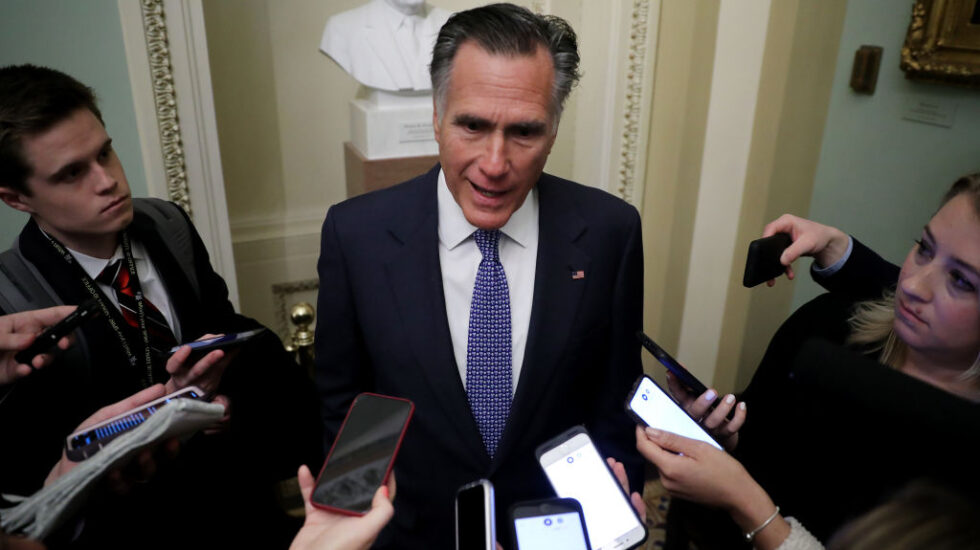Are the anti-Trump antibodies finally kicking in to defend the Republican Party?
Just days after former Vice President Mike Pence rebuked his twice-impeached running mate, several prominent GOP Senators lashed out at the Republican National Committee for its decision to censure Reps. Liz Cheney of Wyoming and Adam Kinzinger of Illinois.
In censuring the two vociferous MAGA critics, the RNC cited their participation in the House’s January 6th investigation, calling the probe, in Trump-ian terms, “a Democrat-led persecution of ordinary citizens engaged in legitimate political discourse.”
That stunning characterization of a ransacking that led to the injury of 140 police officers, millions of dollars in property damage, and more than 700 prosecutions has created an intense backlash from Republicans in the upper chamber, even as RNC Chair Ronna McDaniel tried to claim the description wasn’t intended to describe rioters who were violent that day.
Sen. Mitt Romney (R-UT) called the censures “a very unfortunate decision by the RNC and a very unfortunate statement put out as well. Nothing could be further from the truth than to consider the attack on the seat of democracy as legitimate political discourse.”
Those “who assaulted police officers, broke windows and breached the Capitol were not engaged in legitimate political discourse, and to say otherwise is absurd,” said Sen. Susan Collins (R-ME) to POLITICO.
Collins worries that the GOP will waste its “decided advantage on the issues that will determine the outcome of the fall elections” by “re-litigating a lost election or defending those who have been convicted of criminal behavior.”
Similarly, Sen. Lindsey Graham (R-SC) said the RNC censures indicate that the party is moving “in the wrong direction.”
“All of us up here want to talk about forward not backward,” Graham told POLITICO.
Sen. John Cornyn (R-TX) told the outlet that the censures make it “more challenging” for the GOP to win elections. “I don’t think you can kick out of the party everybody you disagree with. Or it’s going to be a minority party,” he said.
Sen. Shelley Moore Capito (R-WV) echoed that sentiment: “We’ve got a lot of issues that we should be focusing on besides censuring two members of Congress because they have a different opinion. I thought: Free speech for everybody.”
POLITICO reports that it found just one GOP senator who defended the RNC censures:
Among more than a dozen GOP senators interviewed Monday, just Sen. Rand Paul (R-Ky.) said he agreed with the decision, though several did criticize the Jan. 6 panel. Paul said he would “include Liz Cheney and Kinzinger as basically Democrats now” and alleged they are abusing their power on the Capitol riot committee.
POLITICO adds:
A subset of the House GOP, most of them members of the conservative Freedom Caucus, is pushing to have [Cheney and Kinzinger] booted from the conference. So far, [House Minority Leader Kevin] McCarthy and other GOP leaders have opposed taking such measures.
“They don’t represent the party. They should be censured — if not stronger,” said Rep. Ralph Norman (R-S.C.), a member of the Trump-ally-stacked Freedom Caucus.
Removing Cheney and Kinzinger from the GOP conference would win praise from Trump and his network while sparking an avoidable intra-GOP fight guaranteed to divert attention from House Republican efforts to retake the majority. Some rank-and-file Republicans questioned why such an action needed to be taken in the first place.
“They’re out of their league, quite honestly,” said Sen. Kevin Cramer (R-N.D.) of the RNC. A former House member, Cramer argued voters make the call every two years whether to censure House members: “To me, it’s diminishing of the people’s House.”
The censures were submitted by longtime GOP operative and RNC member David Bossie. Vanity Fair, citing sources close to Bossie, reports that he wants to take over the RNC next year and that the censures were a way to draw support from Donald Trump.



